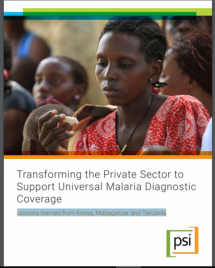Transforming the Private Sector to Support Universal Malaria Diagnostic Coverage
This brief identifies ten lessons learned on how to stimulate a private-sector market for malaria diagnostics using evidence and experience from three intervention countries where Population Services International lead implementation: Kenya, Madagascar, and Tanzania.
It comes out of a three-year project between 2013 and 2016 to increase the uptake of quality-assured mRDTs in private-sector markets in Kenya, Madagascar, Nigeria, Tanzania, and Uganda. Despite significant reductions in malaria in endemic countries over the past decade, fever is still often equated with malaria, leading to overuse of artemisinin-based combination therapy (ACT), the frontline treatment for malaria, and to mismanagement of other potentially life-threatening nonfebrile illnesses.
Designed as the largest operations research project in fever case management (FCM) globally, the UNITAID-funded project generated evidence and lessons learned on how to stimulate a private-sector market for mRDTs. Over 44 studies were conducted by three partners, and routine monitoring systems collected data from 3,400 enrolled outlets, ranging from hospital clinics to pharmacies to drug shops.
This brief outlines 10 lessons learned from this project, and calls to action as a result of the work.
Last modified: March 25, 2019
Language: English

